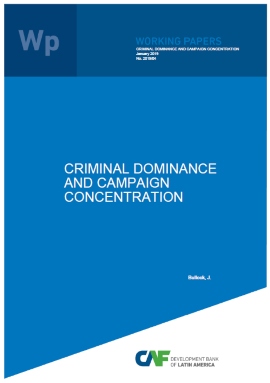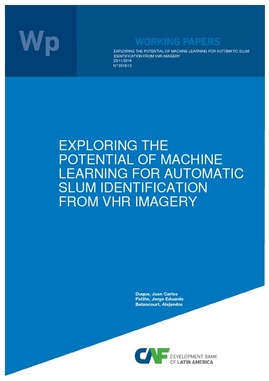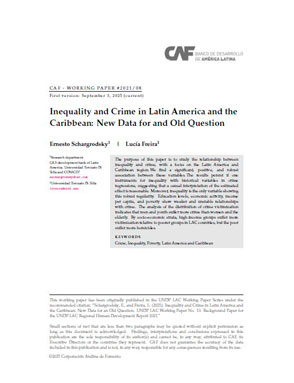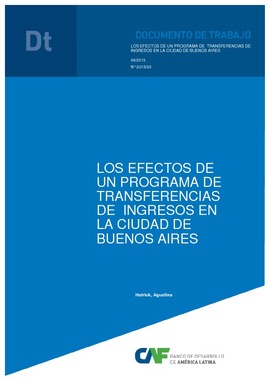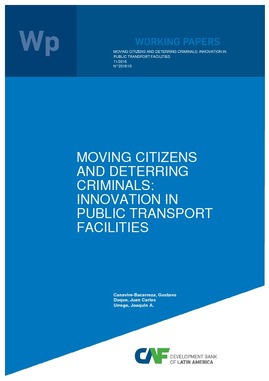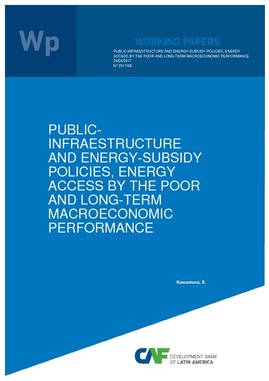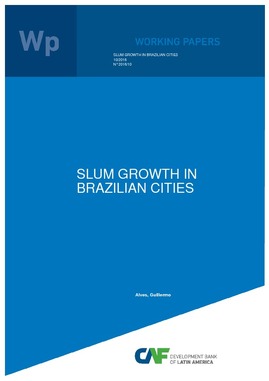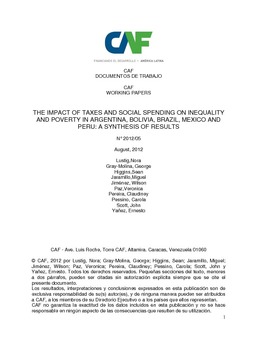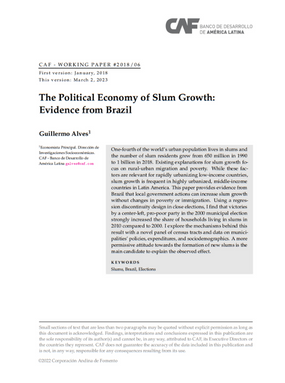Listar6.1 Documentos de trabajo en investigación socioeconómica por tema "Pobreza"
Mostrando ítems 1-16 de 16
-
Criminal Dominance and Campaign Concentration
(CAF; Caracas, 2019-01-1)There are many journalistic and anecdotal accounts about the prevalence of electoral corrals in Brazil, geographic areas where brokers, politicians, or community leaders influence residents to vote for a specific candidate. ... -
Determinants of Slum Formation: The Role of Local Politics and Policies
(CAF; Caracas, 2018-01)One-third of the developing world’s population lives in urban slums and the absolute number of slum residents grew from 650 million in 1990 to 863 million in 2012. Although negative impacts of slum living conditions on ... -
Exploring the Potential of Machine Learning for Automatic Slum Identification from VHE Imagery
(CAF; Buenos Aires, 2016-11-23)Slum identification in urban settlements is a crucial step in the process of formulation of propoor policies. However, the use of conventional methods for slums detection such as field surveys may result time consuming and ... -
Gender Gaps in Labor Informality: The Motherhood Effect
(CAF; Caracas, 2020-12-15)We estimate the short- and long-run labor market impacts of parenthood in a developing country, Chile, based on an eventstudy approach around the birth of the first child. We assess mechanisms behind these effects based ... -
Inequality and Crime in Latin America and the Caribbean: New Data for and Old Question
(CAF; Caracas, 2021-09-07)The purpose of this paper is to study the relationship between inequality and crime, with a focus on the Latin America and Caribbean region.We find a significant, positive, and robust association between these variables. ... -
Inequality, Crime, and the Long Run Legacy of Slavery
(CAF; Bogotá, 2016-12-25)This paper investigates the relationship between economic inequality and crime in Colombian municipalities. Following recent scholarly research that suggests that the legacy of slavery is largely manifest in persistent ... -
Life expectancy at retirement and income levels in Chile
(CAF; Caracas, 2020-06-15)We document that life expectancies at the age of retirement differ significantly by income levels and gender in Chile. Using a sample of over 500 thousand workers that retired under the annuity system, we find that, ... -
Los efectos de un programa de transferencias de ingresos en la ciudad de Buenos Aires
(CAF, 2015-06-01)Las transferencias condicionadas de ingreso, ampliamente extendidas en América Latina, afectan decisiones económicas de sus beneficiarios y tienen impactos sobre distintas dimensiones de su bienestar. En este trabajo, ... -
Moving Citizens and Deterring Criminals: Innovation in Public Transport Facilities
(CAF; Buenos Aires, 2016-11)This paper explores the relationship between urban public transportation innovation and crime. In 2004, the city of Medellin in Colombia developed an innovative public transportation system based on cable cars (Metrocable) ... -
Poor Little Children: The Socioeconomic Gap in Parental Responses to School Disadvantage
(CAF; Buenos Aires, 2017-11-08)In this paper, we study how parents react to a widely-used school policy that puts some children at a learning disadvantage. Specifically, we first document that, in line with findings in other countries, younger children ... -
Public-infraestructure and energy-subsidy policies, energy access by the poor and long-term macroeconomic performance
(CAF; Bogotá, 2017-04-24)This paper presents the main set-up and long-run results from a simple deterministic version of a dynamic stochastic general equilibrium model of a small open economy in Kawamura (2017). The model assumes two types of ... -
Savings Groups Reduce Vulberability but have Mixed Effect on Financial Inclusion
(CAF; Caracas, 2021-01-08)This paper evaluates the impact of the introduction of savings groups on poverty, vulnerability, and financial inclusion outcomes in rural Peru. Using a cluster randomized control trial and relying on both survey and ... -
Slum Growth in Brazilian Cities
(CAF; Caracas, 2016-10-10)I study slum growth in contemporary urbanization processes by estimating a spatial equilibrium model with houses with and without basic water and sanitation services in Brazilian cities between 1991 and 2010. Slum growth ... -
The impact of taxes and social spending on inequality and poverty in Argentina, Bolivia, Brazil, Mexico and Peru: a synthesis of results
(CAF; Caracas, 2012)We apply a standard tax and benefit incidence analysis to estimate the impact on inequality and poverty of direct taxes, indirect taxes and subsidies, and social spending (cash and food transfers and in-kind transfers in ... -
The Political Economy of Slum Growth: Evidence from Brazil
(2023)One-fourth of the world’s urban population lives in slums and the number of slum residents grew from 650 million in 1990 to 1 billion in 2018. Existing explanations for slum growth focus on rural-urban migration and poverty. ... -
What is the Role of Urban Growth on Inequality, and Segregation? The Case of Urban Argentina´s Urban Agglomerations
(CAF; Buenos Aires, 2016-11)We analyze the relationship between urban sprawl and changing patterns of inequality and segregation in metropolitan areas of Argentina. The existing literature has endeavored to study the determinants of the expansion of ...


